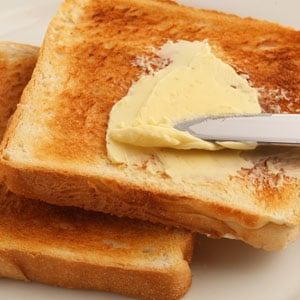
It is, therefore, not surprising that I was recently accosted by one of my friends waving a tub of butter spread in the air and pointing an accusing finger at the label where it shows that the product in question contains 3.5 gram of trans fat per 100 gram. “How is this possible in view of the legislation?” she demanded to know.
Trans fat confusion
What my friend had stumbled on, is the seemingly contradictory situation regarding the sale of foods that contain trans fats in this, and other countries. To try and explain what is going on, we need to understand two important things about what can be called "the family of trans fatty acids":
- Not all trans fats/fatty acids are the same
- Not all trans fats/fatty acids are classed as potentially harmful
"But," you ask, "How on earth is this possible, when we have been told that all trans fats are potentially fatal and implicated in the development of a host of diseases, particularly heart disease, diabetes and the metabolic syndrome? We have been told that trans fats are pure poison! And now you come along and say that there are trans fats that are not harmful and that there are some that may even be beneficial! What is the world coming to?"
Well, as usual this trans fatty acid confusion is due to the fact that the harmful effects of these fats/fatty acids have been presented to the public as a single concept: "All trans fats/fatty acids are Bad!” What was not pointed out during the campaign to make the public aware of the risk of eating foods with high trans fatty acid contents, is that certain trans fats/fatty acids which are found in nature may not be harmful and may indeed be beneficial. Take conjugated linoleic acid (CLA) which is used in many supplements and may aid weight loss - it too is a trans fatty acid!
What does the regulation say?
Regulation R. 127 published by the Department of Health as a "Regulation relating to Trans Fat in Foodstuffs", as part of the Foodstuffs, Cosmetics & Disinfectants Act, 1972 (Act No. 54 of 1972), defines two types of trans fats/fatty acids, namely:
- “Industrially produced trans-fatty acids” means all the geometric isomers of monounsaturated fatty acids with one or more trans double bonds, i.e. C14:1, C16:1, C18:1, C20:1, C22:1 and polyunsaturated fatty acids with one or more trans double bonds, i.e. C18:2, C18:3, C20:2, C22:2 having non-conjugated, interrupted by at least one methylene group, carbon-carbon double bonds in thetrans configuration and excludes natural trans fatty acids.
- “Natural trans fatty acids” means an unsaturated fatty acid with one or more non-conjugated double bonds, interrupted by at least one methylene groups, in a trans-configuration consisting mainly of vaccenic acid (VA) [18:1(n-7)] or conjugated linoleic acid (CLA).
The Regulation also defines vaccenic acid and CLA as follows:
- “Conjugated linoleic acid (CLA)” means bacterial metabolites mainly found in products from ruminant animals, e.g. dairy products and beef, that comprise a family of geometric and positional isomers of linoleic acid with two conjugated double bonds, of which there are two major forms, namely cis9, trans11-CLA and trans10, cis12-CLA.
- “Vaccenic acid (VA)” means 18:1 trans-11 [18:1(b-7)] and is a geometric and positional isomer of oleic acid with a single double bond and is the precursor of conjugated linoleic acid (CLA).
Finally R. 127 includes the following very important definition:
- “Trans fat” has a corresponding meaning to “Industrially produced trans fatty acids”.
(Government Gazette, 2011)
What does this mean?
In plain language the definitions used in Regulation 127 which bans the sale of foods that contain trans fatty acids, show that the trans fats/fatty acids that the legislation bans are the Industrially produced trans fatty acids (in other words, trans-fats produced by partial hydrogenation of unsaturated oils) and not the Natural trans fatty acids. As per definition, CLA and its precursor VA (vaccenic acid) are not banned and foods that contain natural trans-fats such as CLA in amounts exceeding 2 gram per 100g, are not banned either.
This is why you will find that meat (lamb, mutton, beef), dairy products (full cream milk, yoghurt, cream cheese and other cheeses), cream and butter may contain more than 2g of trans fatty acids per 100g or 100ml and not be banned, because the trans fats in question are natural trans fatty acids.
The butter spread product my friend was so upset about, contains butter which contains “natural trans fatty acids” and is thus not banned by the trans fat legislation.
So while it is important to avoid trans fatty acids that are industrially produced by hydrogenation, so as to prevent heart disease, diabetes and the metabolic syndrome, the moderate intake of certain trans fatty acids such as CLA from natural foods, is not regarded as harmful. Ongoing research will hopefully determine if CLA has protective effects and at what level it can be consumed safely.
- (Dr IV van Heerden, DietDoc, first published on 8 October 2012)
(Photo of toast and butter spread from Shutterstock)
(References: Government Gazette (2011). Regulation R. 127. Regulation relating to Trans-Fat in Foodstuffs. Foodstuffs, Cosmetics & Disinfectants Act, 1972 (Act No. 54 of 1972). Government Gazette, No. 34029, pp. 3-6, 17 February 2011; Schönfeldt HC, Hall N, 2012. Red Meat in Nutrition & Health. Chapter 7: Red Meat & Fat. Published by: The Institute of Food, Nutrition & Well-being, University of Pretoria, Pretoria.)
Read more:
SA declares war on trans fats
Still confused about fats?




 Publications
Publications
 Partners
Partners










